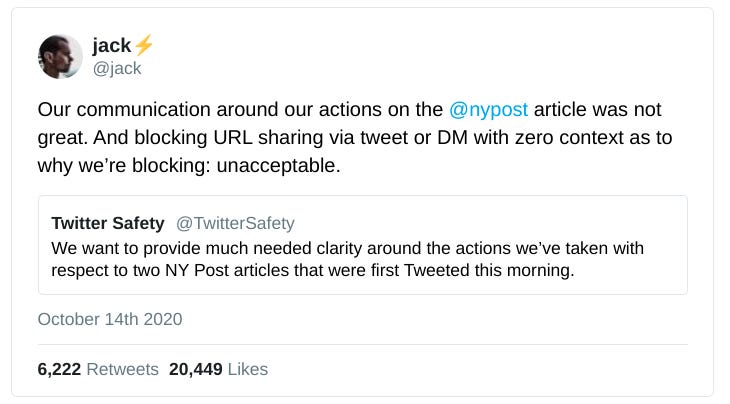The Gen Z generation is redefining what it means to work and socialize, China’s property market is hanging on by a thread and Snap is delving deep into AR.
Dorsey’s fight for free speech
From Pirate Wires, by Mike Solana
Jack Dorsey was often conflicted over Twitter’s stray into authoritarian territory 👆
During a tech executive panel before Congress, Dorsey fully regretted Twitter’s cases of censorship and noted strong opposition towards theoretical federal censorship. Dorsey didn’t trust himself nor Congress with censorship.
Under Dorsey, Twitter explored many new anti-authoritarian decentralized possibilities and tools to liberate information and empower counter-voices.
24 hours after Dorsey’s resignation, Twitter updated its content policy in a way which seems to essentially makes citizen journalism impossible.
China’s real estate crisis
From the mesha tribe
Xi Jinping finally announced China would cut the reserve requirement ratio, freeing ~ $188 billion of liquidity, and also promised to uphold a “flexible” monetary and fiscal policy over the coming year.
These announcements come just after China’s most indebted developer, Evergrande Group, failed to meet a $260 million obligation, causing share prices to drop to a record low of 20%.
China’s measures are only temporary relief. With property developers needing to make $1.3 billion in US bond payments this month alone alongside a global supply crisis and an Omicron variant the risk management is far from over.
Snap’s AR future
From Platformer, by Casey Newton
AR is slowly moving out of the novelty sphere and towards broader use cases.
In 2016 Snap created Spectacles, the first major high-tech glasses and this year they received some AR upgrades. While they are currently only available for developers, Snap hopes the iPhone of the future will emerge.
Snap began its AR project well before its competitors and has taught its users over time that a screen can be a window into real-world experiences.
Snap hopes to create a “singular, holistic platform in which an AR creator can make something really compelling, and get that in front of people and then build a career or business.”
It’s a Gen Z world
From Digital Native, by Rex Woodbury
Gen Z’s are redefining the world we live in:
🌍 Sustainability: Fashion is responsible for ~10% of greenhouses gases emitted. Gen Z’s are pressuring for sustainable fashion while spearheading a second-hand fashion movement to replace the fast fashion industry.
💰 Entrepreneurship: 80% of Gen Z’s want to be their own boss and 50% want to start their own business, rejecting their parents’ previously financially stable paths.
🗣 Socialization: Take Netflix parties, social trading or Li Jiaqi’s social commerce live streams. Gen Z’s are unaware of a world without constant online social communication and are creating new forms of community.
Crypto sceptic or superfan?
From BIG, by Matt Stoller
Crypto is simply a set of markings; a social movement based on points on a ledger having intrinsic value.
The movement is grounded firmly on dynamic storytellers painting images of a Utopian future - its value coming from a large collective belief in this picture.
The crypto (and anti-monopoly) movement emerged out of a need to fight neoliberal corruption - to create a money-like tool free from the government.
Extra Reading
Investing on Instinct with no data (Napkin Math, Evan Armstrong)
The multiverse of metaverse: frameworks and maps (Chinese Characteristics, Lillian Li)
Careers in 2022: 18 trends (The Jungle Gym, Nick deWilde)
The NBA innovating with NFTs (Huddle Up, Joseph Pompliano)
Resources from 60+ case studies of First 1000 (First 1000, Ali Abouelatta)
Some techno-optimism for 2022 (Noahpinion, Noah Smith)








